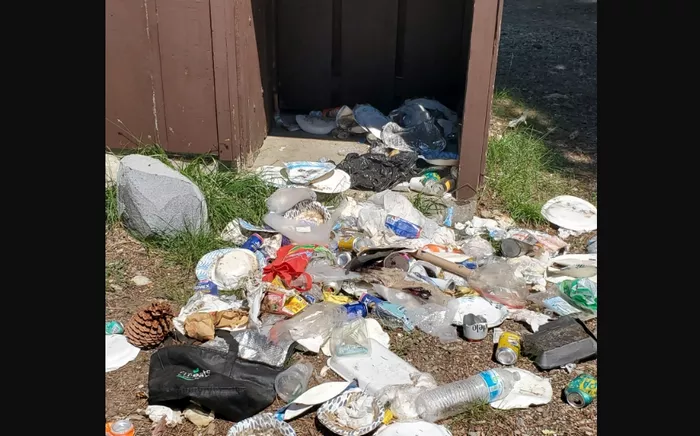As summer arrives, garbage and unsafe behavior have once again become problems at dispersed campsites throughout the Bowman corridor.
Dispersed camping refers to camping outside of organized campgrounds without formal reservations or fees. This style of camping is popular across the Bowman corridor, including areas around Bowman Lake, Faucherie, Sawmill, and French lakes, all managed by the Nevada Irrigation District (NID).
However, dispersed camping areas lack services such as trash pickup and restroom facilities. When campers leave behind garbage, it creates serious public health risks. Additionally, unattended campfires pose a significant danger to the forest. Fires left unchecked can quickly spiral out of control, and even leftover ashes and embers can ignite new fires.
“The bottom line is you have responsibilities when you choose to disperse camp,” said Monica Reyes, NID Director of Recreation. “Whatever you bring in, you must pack out. Dumping garbage, leaving toilet paper scattered through the forest, and driving away while a campfire still smolders is not acceptable. It’s beyond reckless.”
While dispersed camping is allowed on federal lands and near NID reservoirs, no staff are dedicated to cleaning up after campers. NID’s recreation team, which patrols Bowman Lake, frequently discovers garbage and smoldering campfires. They must haul out trash, extinguish embers, and clean these sites to protect public health and safety.
The “pack it in, pack it out” rule is vital: whatever you bring must be taken back with you. Beyond being unsightly, leftover food attracts bears. When wild animals get accustomed to human food, they tend to seek it out aggressively, creating safety hazards for people.
On a broader scale, Bowman Lake sits within the Sierra headwaters, supplying water to much of California. Healthy forests and watersheds help slow climate change, and keeping these areas clean and safe is essential for the future.
“Treat NID’s upper division—the source of your water—like your own home. Keep it clean and safe; your actions have consequences,” Reyes emphasized. “For anyone heading to remote dispersed camping sites, it’s crucial to understand your impact on the land. Most importantly, recognize the dangers and damage caused by careless behavior.”
She concluded, “By packing out your trash and leaving the area clean, you help keep the Bowman Corridor beautiful and safe for the next visitors to enjoy.”
Related Topics
- Top Camping Escapes from Rivers to Ridges in NSW and Upper Victoria
- Greenville, Maine: A Remote Gem That Captures the Heart
- Surge in Rural Getaways: North Yorkshire Campsites See Record Booking Boom

